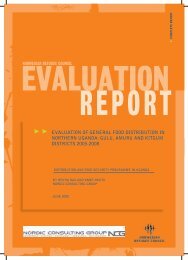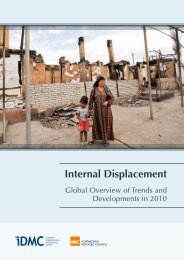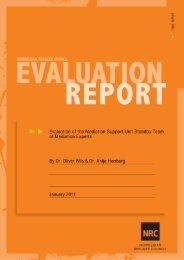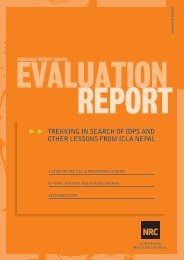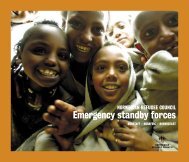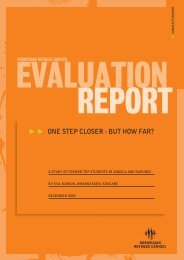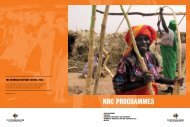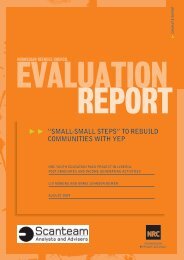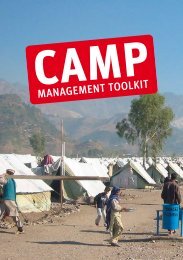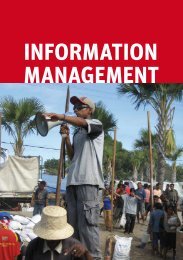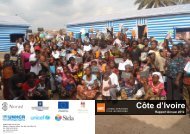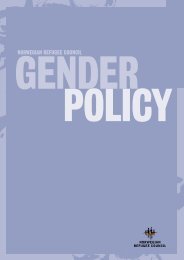Download report here - Norwegian Refugee Council
Download report here - Norwegian Refugee Council
Download report here - Norwegian Refugee Council
You also want an ePaper? Increase the reach of your titles
YUMPU automatically turns print PDFs into web optimized ePapers that Google loves.
Evaluation of NRC Food Security and Livelihoods Projects in Chiredzi and Chipinge Districts of Zimbabwe10. Partnerships with Government StakeholdersGovernmental and technical stakeholders interviewed included representatives from Governmentdepartments (Agritex, Social Services, District Administrators Office). Government staff <strong>report</strong>edattending Workshops before the commencement of the NRC project, and coordination and cooperationof NRC projects with activities of Government departments was regarded as good. Inclusion ofGovernment technical staff in Trainings of Trainers was seen as capacitating local support structures,and promoting continuity of support to beneficiaries after the project end. NRC was seen as focusing onincreasing capacity of local agencies and Departments to provide ongoing support to local communities,and to provide support in Wards not targeted by NRC. In addition this approach was seen as successfulin avoiding duplication of, or conflict with, the work of local government Departments. NRC’s projectswere described as capacitating local people in life skills, thus enabling them to become self supporting.NRC’s projects were seen as relevant to the needs of the Districts. Community Based Planningactivities conducted by NRC led to the development of Ward Plans which were subsequently approvedand adopted by the District <strong>Council</strong>. Many Government Ministries and NGOs were <strong>report</strong>ed to haveparticipated in Ward Plan development, resulting in good levels of inclusiveness. No complaints fromcommunities or local <strong>Council</strong>lors had been received by District Officers. Key recommendations fromGovernment officials interviewed included: Requests for expansion of NRC activities to include more beneficiaries and Wards.Continue capacitating of Department staff through inclusion in Trainings.More advance notice of NRC plans (e.g. at proposal stage) to allow greater opportunities for inputinto development of projects. Short notice was cited as resulting in a lack of time for revision, sothat projects had to be accepted as they stood in order to get things implemented.Extend the duration of the Cash Grants given to promote opportunities to build IGAs and reducerisk of basic needs expenditures eroding opportunities for livelihoods expenditures.Increase the amount of the Small Community Grants, as $5000 is insufficient to meet the cost ofthe facilities required. In some cases local Government met the shortfall through joint funding.A longer term approach was seen as needed to increase the tangible benefits secured.Priority areas of need for future NRC interventions were seen as (1) expansion of water andsanitation (WASH) activities. T<strong>here</strong> are very few sanitary toilets in the resettlement areas, andpeople travel long distances to source water. (2) Educational support, as t<strong>here</strong> is a lack ofeducational provision in the resettlement areas.Agritex felt priorities for future programs should include seed fairs as many people have problemsaccessing small grains seeds of good quality. They felt NRC should facilitate access to goodquality seeds and training in seed multiplication of OPVs.Agritex Chipinge indicated that training courses in communities were sometimes implementedwithout their being notified in advance, and requested that NRC should ensure proper advancenotice was always given to District officials.District officials (Agritex, Social Services) in Chipinge requested inclusion in regular field monitoringvisits (quarterly). Written <strong>report</strong>s were not felt to be adequate to ensure they were abreast ofdevelopments. They were invited to launch events but not follow up visits.11. NRC Project Staff Support and DevelopmentStaff are able to request trainings they feel will assist their professional development and benefit theirmanagement of the projects. Areas identified by staff w<strong>here</strong> it was considered that skills developmentand /or additional training would be beneficial included: exchange visits to other projects to share information and learning WASH training, and Participatory Health and Hygiene (reflecting the key needs of the Districts) training in basic construction knowledge and skills for supervision of construction projects climate Change adaptation <strong>report</strong> writing skills20




